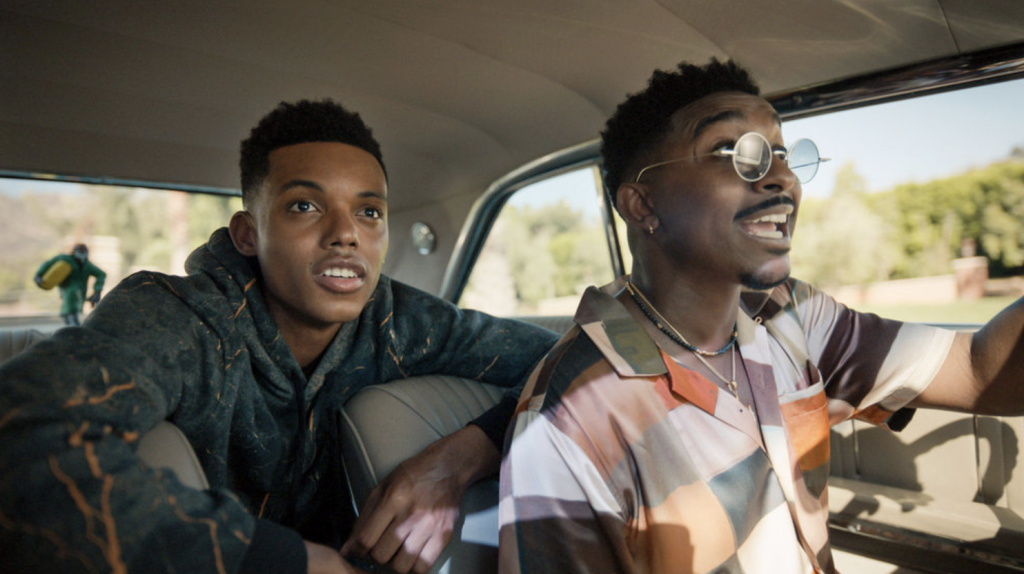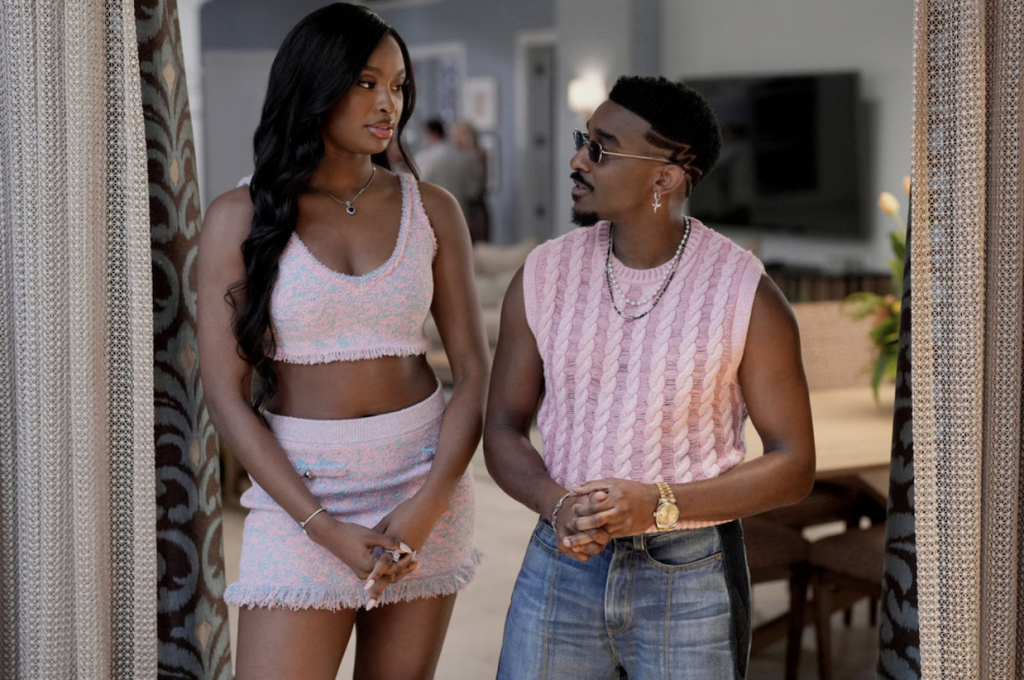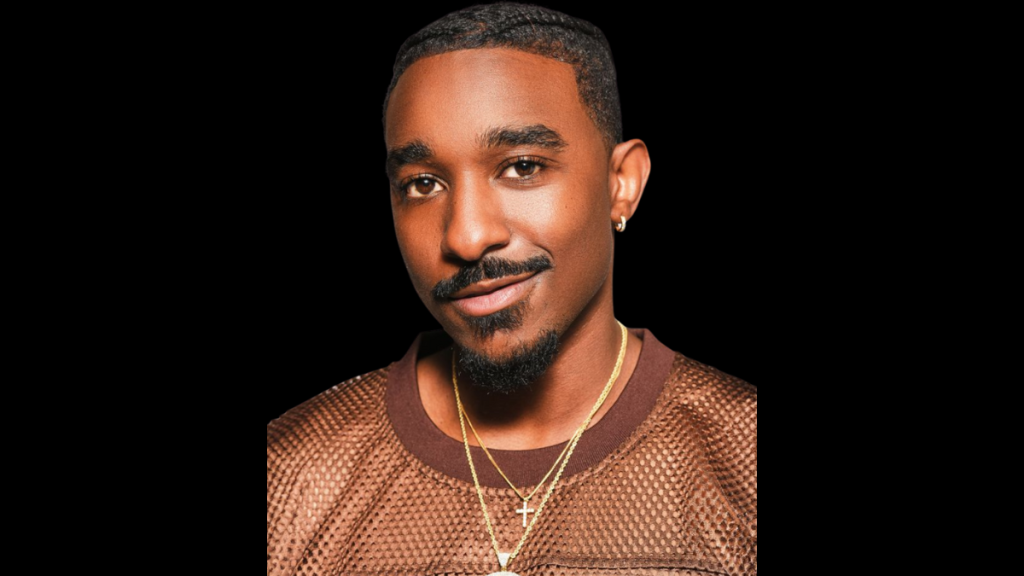After four seasons of redefining a classic, Bel-Air is preparing its final bow, and for Jordan L. Jones, who plays the modern-day Jazz, the ending feels a lot like graduating from college. It’s bittersweet, full of memories, and packed with lessons he’s taking into the next chapter of his life.
“I feel grateful,” he shared during our interview. “Time only has flown by at the end… I’ve just been so blessed and grateful to be with such a good cast and such a good writers’ room, directors, everybody… I’ve just been so grateful.”
But beyond the work, it’s the brotherhood behind the scenes, the organic friendships, the laughter, the hanging out on off days, that defined his time on the show.

For many actors, set life is work. For Jordan, it became community.
“There were times where… if I’m not working, I’m not on the schedule that day, I still pull up, get some lunch, go look at some scenes, go hang out with Jabari [Banks] and Olly [Sholotan] and Simone [Joy Jones] in the trailer.”
That camaraderie wasn’t forced. It grew naturally from a tight-knit cast that genuinely enjoys being around each other. It also seeped into the show’s on-screen chemistry, especially the dynamic between Will and Jazz.
“Art imitates life,” Jordan explained. “What I brought to the script was a lot of my actual experiences… Us and our relationship helped the acting. It helped the dialogue… I think that’s what helped people love our show so much.”
Jordan shared how closely real life mirrored the script, especially the moment in Season 2 when Will is staying at Jazz’s place. In reality, Banks actually lived with Jordan for a short period between apartments, long before the writers ever knew.
“After Season 1, Jabari stayed at my crib… he didn’t have his new place yet, so I was like, ‘Bro, you can stay with me,’” Jordan explained. When they returned to set and saw the storyline, both actors were stunned.
“It was so strange… we were like, ‘Bro, did they know you were staying here?’” he laughed. The coincidence became a testament to how naturally their off-screen brotherhood informed the authenticity of their on-screen relationship.
Jordan’s personal story also aligns with Bel-Air’s main storyline and the Jazz character. Born in Dallas and raised in Los Angeles, he attended a predominantly Black public school before transferring to a majority-white private school in Brentwood, an experience that echoes Will’s move from Philly to Bel-Air.
“One thing I learned there was to not change who I am based upon the rooms that I’m going in,” he said.
That same lesson is at the heart of Jazz’s early interactions with Will. In the series’ iconic mountaintop scene, Jazz encourages Will to stay rooted in who he is, even as everything around him becomes unfamiliar.
These parallels between Jordan’s life and Jazz’s storyline helped him bring authenticity to every scene.
“Some of the stuff that we go through, it’s like… dang, is there cameras in our crib?” he joked. Sometimes, the writers unknowingly mirrored his real-world experiences so closely that the lines between acting and life blurred.
Of all the elements Jordan embraced, the biggest transformation came internally.
“I learned to be more vulnerable,” he admitted when asked what he learned about himself from playing Jazz. “I always wanted to be like, be hard… don’t ever let them see you sweat. Don’t show emotion.”
But Bel-Air demanded emotional truth. When Jordan and Banks shot the Season 1 finale, where Will breaks down over family betrayal, Jordan unexpectedly found himself crying.
“I did not think that was Will. I was thinking, ‘This is my friend who is going through something.’” It changed him. “Sometimes when you’re in a situation, don’t think about what’s next… Really listen and be in it.”
Playing Jazz cracked open something deeper. It made space for vulnerability, introspection, and emotional presence, traits he’s adopting not just as an actor, but as a man.
Bel-Air stands out for the way it portrays modern Black masculinity with nuance. Jazz isn’t a caricature; he’s confident but flawed, smooth but insecure, loyal but human. Jordan appreciates that the show gives space for all of those layers.

“Even like the people that you think are the strongest, they still got their flaws. They still go through stuff.” His relationship with Hilary, for instance, explores timing, emotional honesty, and the tension between confidence and insecurity.
“Sometimes it’s not delusion. Sometimes it’s just not the right time.” It’s a refreshing depiction of a Black man expressing desire, disappointment, softness, and strength.
While Jordan keeps Season 4 details close, he promises fans something deeply satisfying. “Closure doesn’t mean… do I get back with Hilary or not. Closure is just that peace within. And that peace, earned, messy, and emotional, extends to the entire cast.
“In our finale, everyone’s going to cry for sure… I think the way that we end this is literally a chef’s kiss.”
With Bel-Air wrapped, Jordan is ready for new chapters. He has a film on the way (Starstruck, releasing in 2026), and he’s energized by the unknown.
“The fear of the unknown sometimes really excites me,” he said. “I want to keep doing other projects… and look back on this and be like, man, this shaped me.”
The fourth and final season of Bel-Air premieres today on Peacock.
Through brotherhood, storytelling, and soul work, Jordan L. Jones walked away from Bel-Air a different man—a more vulnerable one, a more self-aware one, and one committed to telling authentic stories about Black life and Black men.
Photo Credit: Irvin Rivera / Peacock




